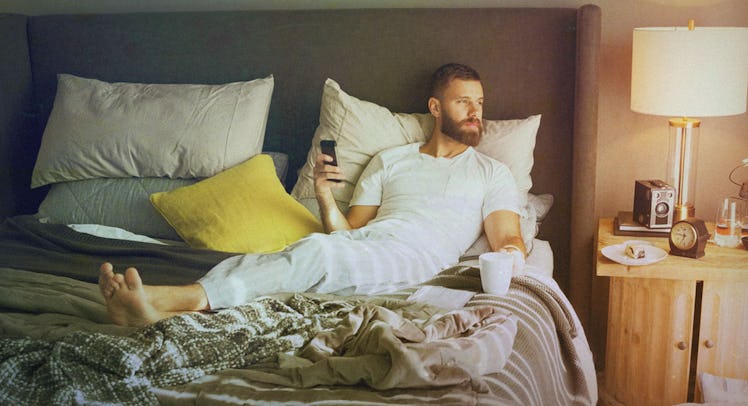How to Keep Burnout From Messing With Your Work-Life Balance
“We have gas and we have brakes just like a car. If we continued to drive our cars the way we drive ourselves, our cars would go off a cliff or burn out.”

Calm is currency. This has always been true, but now even more so in our overstimulated, work-life-(un)balanced world where lines blur and stress reigns supreme, the ability to be level headed when others are not, to be chill in a world that is anything but, is a big attribute.
And in this day and age, it’s also essential, per Bryan Robinson. Robinson is a licensed psychotherapist in Asheville, North Carolina, and the author of the new book #Chill: Turn Off Your Job and Turn On Your Life which offers mindfulness exercises for every day of the year. His chill goes far beyond the Netflix-ism and has a much larger meaning
“[Chill is] not passive, it’s active,” he says. “It’s a place we go inside. And when you’re in the place of chill you’re clear minded, you’re calm, you’re more productive, the quality of what you produce, is better and you feel better on the inside. You’re mentally and physically healthier and that’s a fact.”
Nearly all of us, could use a little more chill in our lives. But the fact is that we’re often so busy trying to get ahead, or just above water, that de-stressing becomes something we’ll eventually get to as opposed to something we do more regularly.
This, Robinson says, is where the problem lies. If you don’t make time to chill, then your productivity will decrease and you’ll actually end up falling behind.
“You’re going to get to your goals quicker, and I know it’s a paradox, but it’s true,” he explains. “We have gas and we have brakes just like a car. If we continued to drive our cars the way we drive ourselves, our cars would go off a cliff or burn out.”
How, then, can we apply the brakes or let the engine idle? In #Chill, Robinson offers a suggestion that swears works and takes but five minutes per day: Spend five minutes of quiet time in the morning, he says. Sit somewhere where you can be alone and focus on the world around you, not the interior one.
“The first thing you do is get out of your thinking mind,” Robinson says. “The thinking mind is the gas. It’s the stress, it’s the worry. When you get out of your thinking mind, you go into this other place, where you focus on any sound you hear. The sound of the heating system, traffic outside or voices in the background. When you’re through, you’ll notice that your heart rate has slowed down, your breathing has slowed down and your muscles are loosened.”
With balancing work life, home life, and personal time becoming an increasingly more difficult juggling act for the average person, that five-minute investment can reap incredible dividends, allowing us to set aside the necessary time and mental energy we need to for both our work and home lives, while avoiding burning out. However, Robinson says, if we do burn out , it’s a choice we’ve made, even unconsciously, by letting our minds drive us instead of taking charge.
“That’s not the way it’s supposed to be,” Robinson says. “The way it’s supposed to be is that I’m in charge of my mind. I’m supposed to be the one who makes decisions about where I go. My life wasn’t always like that, but it’s different now. I’m drawn instead of driven. When you’re driven, you’re going to burn out. That means you have given your power to external situations.”
Now, finding the balance between work and home can be a challenge for a lot of people, especially millennials, who have been dubbed by some “the burnout generation,” which Robinson blames in part on a dependency on devices.
“What I’ve noticed is that people are not in charge of their devices,” he says. “Their devices have become leashes and are in charge of them. If you allow yourself to be attached to an electronic device, that’s your choice. But it will burn you out because you’ve become enslaved to it.”
Of course, it’s not just the Millennials who shoulder the blame for device dependency, and its subsequent burnout, adults are just as guilty.
“Adults are not fully present with their children because they’re on their devices,” says Robinson. “They think that, just because they’re in the same room, or at the soccer game returning emails that that’s being present, but it isn’t. Kids know when you’re not present.”
Device usage aside. How, does Robinson expect parents, who often have the hardest time balancing work and home life, both of which have demands so great that they don’t have the time to devote to such personal pursuits?
“Parenting is an action verb,” he says. “It’s not a noun. Anyone can be a parent. But parenting requires responsibility. When you have kids, you have responsibilities. But here’s the deal: the more we take the time for ourselves as parents, the better spouses and parents we’re going to be.”
Self care, per Robinson, is like being on an airplane and making sure the oxygen mask goes on your face before your child’s. Exercising, eating well, mindfulness. Prioritize these things, per Robinson, and “you’re going to be able to parent automatically, and you’re going to automatically be able to have time for your children. The balance is inside/out not outside/in.”